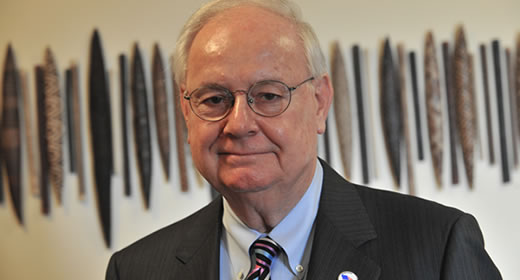
Former U.S. Congressman Dr. John J.H. "Joe" Schwarz is celebrating his 10th year of teaching at the Ford School as he scales back to a slightly less frenetic pace. In this column, he reflects on partisan politics, local governance, and his time at the Ford School.
How about this Presidential election?
I'm embarrassed that it is so bad and it's bad on both sides. I do not know Donald Trump. I know Hillary Clinton a little bit; I traveled with her a couple of times when I was in the Congress. I thought she would win, but that was not to be. Now it is our duty as Americans to do everything we can to see that the Trump administration is both productive and stable—to support policies that we feel help the general good, and to respectfully, but firmly, oppose policies that we feel are counterproductive.
I've always felt that, irrespective of party allegiance, partisanship stops at the water's edge. That was an Arthur Vandenberg saying.
Arthur Vandenberg, the Republican senator and U-M alum?
In my generation, he was the senator we all kind of grew up with him. That's where the term, "bipartisan foreign policy" started. If [Democrat] Truman and [Republican] Vandenberg were able to put together policy positions— especially at the onset of the post- WWII era—and win ongoing support for the United Nations, that was a big thing.
You were a doctor, an otolaryngologist, then decided to run for city commission, then mayor, then state senator. Why?
I made a conscious decision, when I finished my [medical] residency at Harvard, to go back to my home town, Battle Creek, Mich. Then it just fell into place.
The roads have to be paved. The sewage system has to work. The water system has to work. The bridges have got to be okay. The police and fire have got to be top notch. These are exclusively the function of local government.
Cities like Battle Creek, and Jackson, and Kalamazoo, and Midland, and Bay City, and Saginaw, and Flint need local leadership. And people have got to step forward.
Michigan's local government leaders have talked a lot lately about revenue shortfalls...
We have become obsessed with this idea that you just keep lowering taxes, lowering taxes, lowering taxes, even though the upkeep continues and becomes more expensive.
[Those rising costs] reflect inflation and sometimes they reflect the superannuation, the wearing out, of certain things that have to be fixed like roads, like the water system.
The truth of the matter is, there are a hundred Flints out there.... because those lead pipes have been in the ground for over a hundred years.
Later, you served in the U.S. House of Representatives, but not for long.
The amount of time people in Congress, especially junior members, spend fundraising is outrageous....I wouldn't do it. I wouldn't drink the Kool-Aid. I said that's not what I'm here for. I want to study issues so I can make intelligent votes the next day.
Loyalty has switched over to the party. Your loyalty as an elected official should be to your constituents, to your state, to the United States of America, period. Center right Republicans like myself have no more place in Congress. There are only a few of us left.
Then you joined the Ford School?
I had lost my seat in Congress, and [Becky Blank] said, ‘well, do you want to come and teach?' And I thought about it for about 30 seconds and said, ‘sure, I'd love to.' This is my tenth year, and I've loved it. I love the students.
I think people either radical right or radical left would have a difficult time here because this is a group of thinkers. And that's what you want. You want people to look at an issue and try to parse it in a way that's geometric.
[The students] in the Ford School want to learn about government, in all its phases, warts and all. They're committed to learning about government and they are committed to, in one way or the other, doing public service.
What's next for you?
I'll still practice medicine, and I'll do that 'til the day I die. I'm at Grace Health, a federally qualified health center. I went over there 20-plus years ago now. I see patients who have insurance, I see patients on Medicare, I see patients on Medicaid, I see people who have nothing. I'll continue to perform a service in my community.
Schwarz is the subject of a nine-part oral history, recently released by the Michigan Political history Society. Watch the videos online to hear about what he calls his "invisible, invincible, and bulletproof" youth, including his service in Vietnam (for the Navy), in Jakarta (for the cia), and more.
Below is a formatted version of this article from State & Hill, the magazine of the Ford School. View the entire Fall 2016 State & Hill here.